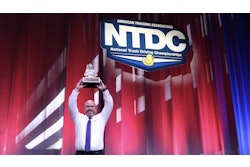
In its latest rulemakings update, the Federal Motor Carrier Safety Administration lists July 31 as its projected publication date for its proposal to reform federal hours of service regulations. The date is not binding and could change.
FMCSA’s hands are tied as to how quickly it can progress, as the agency’s hours of service proposal is still under review by the White House’s Office of Management and Budget. OMB must approve the rule before FMCSA can publish it in the Federal Register. Once published, members of the trucking industry can review the agency’s proposed changes and file public comments. FMCSA again lists a 47-day comment period for the hours of service notice of proposed rulemaking, starting July 31 and ending Sept. 16.
In April’s rulemakings update, the FMCSA listed June 6 as the target publication date, which was missed.
Even if FMCSA meets the July 31 projection, a revised hours of service rule likely wouldn’t take effect until 2020 or later. After the public comment period, FMCSA will analyze feedback and data and then begin the process of forming a final rule to alter hours regs. That process likely would take months, at minimum. After publishing a final hours of service rule, the changes likely would have an effective date of months later — if not longer. For instance, the agency’s most recent hours of service revisions were finalized in December 2011 and didn’t take effect until July 2013 — 18 months later.
That timeline would be needed to ensure ELD makers can adjust their devices and give drivers and carriers time to prepare for the changes.
FMCSA last summer sought feedback on a potential hours of service overhaul, and then the U.S. DOT announced in March that it had filed a proposal with the White House. The proposal has now been under review for more than three months, and it’s unclear when OMB will act to approve the rulemaking.
There’s been no indication from FMCSA what types of reforms it intends to make, but it sought feedback around the 14-hour rule and split-sleeper berth options, as well as the 30-minute break requirement — two of the most unpopular aspects of hours of service regulations among truck operators.








